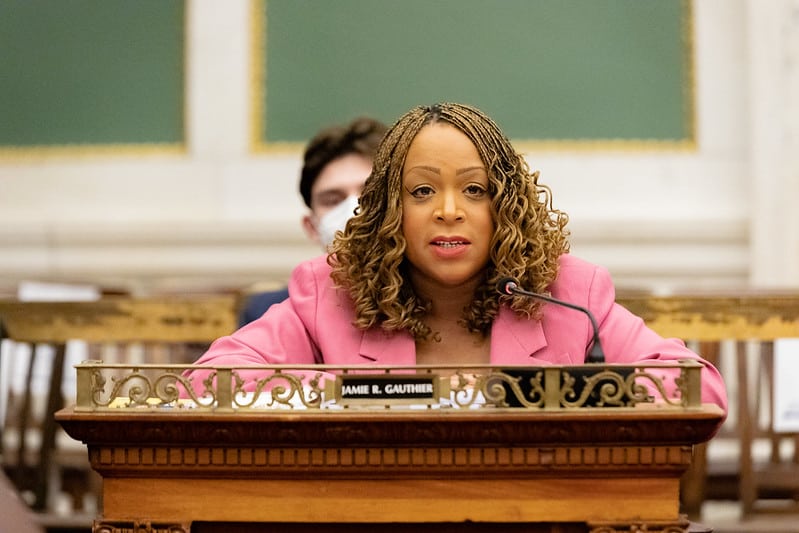
PHILADELPHIA – At today’s City Council meeting, Councilmember Jamie Gauthier (3rd District) introduced a package of bills that make up phase one of her new “Defying Displacement” campaign. As the Chair of Council’s Committee on Housing, Neighborhood Development, and the Homeless, Councilmember Jamie Gauthier will be taking a series of legislative and budgetary actions this legislative term, under the “Defying Displacement” umbrella, to achieve housing justice.
During today’s City Council meeting, Councilmember Jamie Gauthier said: “The very thing that makes Philadelphia, Philadelphia, is under attack. Many of our neighborhoods are becoming hostile to the Black and brown families who stewarded them for generations. The City has a choice, will our communities finally be able to look to their local government as their protector, or will we let the displacement tidal wave wash them away? I for one refuse to sit on my hands as gentrification uproots our neighborhoods. Through Defying Displacement, I am going to bat for our neighborhoods, and I will not rest until every Philadelphian can access safe, stable, and affordable housing!”
If enacted into law, the legislation introduced by Councilmember Gauthier today will:
- Strengthen protections for residents using housing vouchers
- Freeze property taxes for low-income homeowners
- Invest revenue generated by developers buying “density” bonuses back into neighborhoods
“As Vice Chair of the Housing Committee, I proudly stand behind Councilmember Gauthier’s ‘Defying Displacement’ campaign, introduced today to combat housing insecurity in our city,” said Councilmember Rue Landau (At-Large). “These bills are not just legislation; they are a commitment to ensuring every Philadelphian has access to safe, stable, and affordable housing. Together, let’s build a Philadelphia where everyone can thrive, addressing the root causes of displacement and fostering a city that stands as a beacon of housing justice.”
The bills introduced today now head to committee for consideration.
STRENGTHEN PROTECTIONS FOR RESIDENTS USING HOUSING VOUCHERS
The Problem:
- The Fair Practices Ordinance prohibits landlords and property managers from discriminating against persons based on the source of income they use to rent or purchase property. This ordinance already names “housing assistance programs” as a protected source of income, which includes housing vouchers.
- However, a local study found that 67% of landlords citywide refuse to accept housing vouchers. In low-poverty neighborhoods, this number jumps to 83%.
- Discrimination against tenants using housing vouchers is so prevalent that many tenants have no choice but to give up their vouchers if they want to find a place to live. Surrendering their voucher means tenants give up hundreds of dollars in rental assistance each month which they are entitled to by law.
- At Councilmember Gauthier’s hearing on housing voucher discrimination last year, it became clear that the City must crack down on this illegal but common practice.
Councilmember Gauthier’s bill strengthens existing protections by making the following edits to the Fair Practice Ordinance:
- Explicitly identifies rental vouchers such as PHA’s Housing Choice “Section 8” voucher as an example of a “housing assistance program” protected from discrimination.
- Outlines in more detail that it is illegal to communicate and advertise that vouchers cannot be used to rent or buy a property.
- Prohibits property owners from refusing or restricting availability, services, or repairs in a way that would prevent a voucher holder from accessing a unit.
- Prohibits property owners from purposely failing to complete necessary paperwork to process rental vouchers in a timely manner.
- Allows tenants to take private right of action after 100 days instead of 1 year.
- Instructs the Human Relations Commission to provide tenants with a Notice of Right to Sue if the commission cannot complete their investigation within 100 days.
- Makes appeal decisions more accessible for tenants by extending the judicial review period.
FREEZE PROPERTY TAXES FOR LOW-INCOME HOMEOWNERS
The Problem:
- During the last property assessment:
- Over 107,000 residential properties saw increases of at least 50%; the 3rd District saw the highest number of such increases citywide.
- Almost 31,000 assessments increased by at least 100%; over 6,000 assessments increased by at least 200%; 3,500 assessments increased by at least 300%.
- These are sudden increases that are simply too much for the average Philadelphia household to bear.
- The state constitution’s “uniformity clause” mandates that all local and state taxes be flat, with the same percentage applied to all taxpayers or properties. This means the City cannot tax people or entities in different ways unless the Commonwealth enables us to.
- Two-thirds of Philadelphia’s lowest-income homeowners are Black and Hispanic, meaning the current taxation and assessment system has a disproportionate impact on people of color.
- In the summer of 2022, Governor Wolf signed Act 58 of 2022 into law, introduced by Rep. Jared Solomon as HB 581, which permits local tax authorities to provide refunds or forgiveness of real estate taxes to low-income taxpayers.
Councilmember Gauthier’s bill freezes real estate taxes for low-income taxpayers.
- Sets “low income” eligibility at the maximum allowable income for the state PACENET pharmaceutical assistance program, which is about $33K per year for a single-person household. Act 58 requires the City to benchmark income eligibility to PACENET.
- Freezes property taxes at their current level for homeowners within the eligible income range.
INVEST REVENUE GENERATED BY DEVELOPERS BUYING “DENSITY BONUSES” BACK INTO NEIGHBORHOODS
The Problem:
- Philadelphia’s Zoning Code offers allows developers to build larger than their base zoning would otherwise permit if they voluntarily add components to their development that make it more community-minded or environmentally friendly (“density bonuses”).
- There is a density bonus offered for developers who include price-restricted affordable housing in their development, but this density bonus can also be received by submitting a “payment in lieu of providing affordable housing” to the City of Philadelphia.
- These payments are meant to augment the City’s Housing Trust Fund, the primary local funding source used for affordable housing programs and projects.
- However, not once since this “payment in lieu” option began has these density bonuses led to a proportionate increase in the Housing Trust Fund. This means that the neighborhoods where overscaled development happen are not receiving the affordable housing benefits they are entitled to, and that affordable housing programs citywide remain underfunded.
Councilmember Gauthier’s bill proposes a change to the Home Rule Charter whereby these “payments in lieu” must be added on top of the mandatory Housing Trust Fund appropriation that is equal to one-half percent of the General Fund.
- “Payments in lieu” must go into the Housing Trust Fund the following year as new and additional deposits on top of the City’s other allocation requirements.
- For example, if there are $5M worth of density bonus payments in 2024, the FY26 Housing Trust Fund budget must increase by $5M.
- Density bonus payments to the Housing Trust Fund must be spent within specific geographic boundaries to make sure that parts of the city seeing increased development receive the affordable housing assistance they are entitled to.
- Lowers the maximum household area median income (AMI) benefiting from density bonus payments to 100% AMI, which makes AMI thresholds consistent across funding sources and focuses programs on those with the greatest need.
If approved by City Council, Councilmember Gauthier’s proposed change to the Home Rule Charter will be placed on the ballot for consideration by voters.
Note: Councilmember Gauthier also introduced companion bills to amend sections of the Code that relate to the abovementioned spending priorities.
# # #


